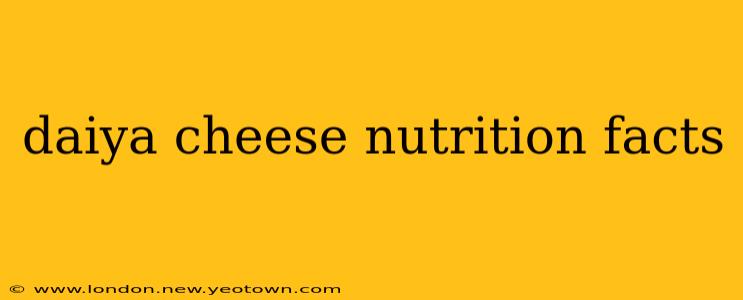Daiya cheese has become a staple in many vegan and vegetarian kitchens, offering a dairy-free alternative to traditional cheese. But what exactly is in this popular plant-based product, and how does its nutritional profile stack up? Let's delve into the world of Daiya cheese nutrition facts, answering some common questions along the way.
This isn't just a simple listing of numbers; we'll explore the ingredients, the impact on different dietary needs, and how Daiya compares to other options. Think of this as your comprehensive guide to understanding the nutritional landscape of Daiya cheese.
What are the main ingredients in Daiya cheese?
Daiya's ingredient list varies slightly depending on the flavor, but generally includes a blend of ingredients designed to mimic the texture and taste of cheese. The core components are often a blend of tapioca starch, coconut oil, and pea protein. These provide the creamy texture and body. Other common ingredients include nutritional yeast (for that cheesy flavor), various gums (for texture and emulsification), and natural flavors. Specific flavors will add additional ingredients, such as onions or herbs.
It's worth noting that the ingredient list can seem lengthy, but this is typical of processed foods, especially those aiming to replicate complex textures and flavors. The absence of dairy ingredients, however, is a key selling point for many consumers.
How many calories are in a slice of Daiya cheese?
The calorie count per slice varies significantly depending on the type and slice size of Daiya cheese. A general guideline is around 40-60 calories per slice, but it's crucial to always check the nutritional information on the specific package you're consuming. These calorie counts are usually lower than many traditional cheese slices.
Is Daiya cheese good for weight loss?
Daiya cheese can be part of a weight-management strategy due to its lower calorie count compared to many dairy cheeses. However, it’s important to remember that weight loss depends on overall dietary habits and calorie expenditure, not just one specific food. Moderation is key. While the lower calorie count is beneficial, it's essential to consume it as part of a balanced diet and not simply as a replacement for other high-calorie foods.
Is Daiya cheese keto-friendly?
This is a tricky question. While a single slice might fit within some ketogenic macro targets, the carbohydrate content, primarily from the tapioca starch, is relatively high compared to other keto-friendly choices. Therefore, while some individuals might incorporate small amounts, Daiya cheese isn't generally considered a staple for those strictly following a ketogenic diet. Always carefully monitor your daily macros.
Is Daiya cheese healthy?
The “healthy” label is subjective and depends on individual dietary needs and goals. Daiya cheese offers a dairy-free and often lower-calorie alternative to traditional cheese. However, it is a processed food and does contain ingredients like gums and starches that some people prefer to limit in their diets. The nutritional value varies by flavor, so always read the label. A balanced approach to nutrition is key, and moderation with Daiya, as with any food, is important.
What are the potential benefits of eating Daiya cheese?
- Dairy-free alternative: Its biggest benefit is its accessibility to individuals with dairy allergies or intolerances.
- Lower calorie count (compared to some dairy cheeses): Can contribute to calorie control in a diet.
- Versatile cooking ingredient: It melts relatively well and can be used in a variety of recipes.
What are the potential drawbacks of eating Daiya cheese?
- Processed food: Contains additives and processed ingredients.
- Moderate sodium content: Sodium intake should be monitored as part of a balanced diet.
- Higher carbohydrate content than some dairy cheeses: Not ideal for those following very low-carb diets.
This detailed analysis offers a more nuanced understanding of Daiya cheese nutrition facts. Always remember that individual dietary requirements and health conditions should be considered before incorporating any new food into your diet. Consult with a healthcare professional or registered dietitian if you have any concerns.

